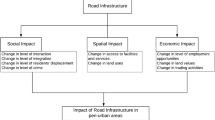Abstract
Cities are dynamic economic and social structures that play a dominant role in both national and international economies. They are centers of population, production, consumption, and development. Cities utilize all advantages of economy of scale, proximity, and concentration. On the other hand, they produce high environmental pressures and diminish thereby the quality of life for urban residents. Indicators (environmental, economic, and governance and management) are seen as a tool that would help policy-makers in formulating urban policy that would lead cities towards sustainability and provide assistance for monitoring their development and municipal performance. The aim of this paper is to consider the role that urban indicators can play in city management. We present basic features of urban indicators that will determine their usefulness in urban management. This paper provides the framework to include environmental and economic indicators, as well as governance and management indicators, in successful urban management.
Similar content being viewed by others
Author information
Authors and Affiliations
Corresponding author
About this article
Cite this article
Jurlina Alibegović, D., Kordej De Villa, Ž. The role of urban indicators in city management: a proposal for Croatian cities. Transit Stud Rev 15, 63–80 (2008). https://doi.org/10.1007/s11300-008-0171-6
Accepted:
Issue Date:
DOI: https://doi.org/10.1007/s11300-008-0171-6




